Stark Holborn's Blog
April 30, 2021
Deadlock (1970)

I first came across Deadlock while perusing dusty corners of streaming services, on the hunt for unusual westerns. And as schlocky as the poster looked, as soon as I read “with a soundtrack by CAN”, my interest was piqued.
If you don’t know, CAN were an experimental German rock group, a mash up of psychadelic, jazz, funk and noise fronted by the maverick Damo Suzuki, who sung freeform, improvised lyrics, often in no particular language.
Like CAN’s music, Deadlock, by writer, producer and director Roland Klick, is at once composite and wholly its own. Klick takes some of the western genre’s most popular tropes – in this case High Noon and The Good, the Bad and the Ugly – and twists them into something new, that can only be described as an existential, acid noir spaghetti western.
The film opens on a sun-blasted wasteland as a young man, the Kid – played by a marvellously nihilistic Marquard Bohm – staggers bloodied and wounded into the desert from a railroad track, clutching a suitcase. Whatever has happened, wherever he’s come from, it doesn’t matter; now he’s in the wilderness, where there’s no water, no shade, no help and no law.
Although in the Kid’s case help, of a kind, does arrive in the form of Mr Dump (Mario Adorf), a desperate, self-delusional man clinging to existence as the “caretaker” of an abandoned mining town. Finding the Kid unconscious, and the suitcase full of money, he considers stoving the young man’s head in with a rock, before reluctantly giving him shelter.
Dump’s former home is like himself, beaten down, now just a carapace of human existence.
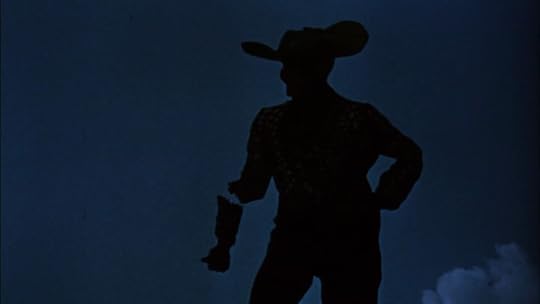
If we were in any doubt about the revisionist, noir elements of Deadlock, the faded billboard above the former saloon depicts the figure of a cowboy, gun arm broken off and swinging hopelessly in the wind. Here’s the dark side of the American West; a nameless, forsaken no-place, proof of the violence wrought by greed, and the despair left in its wake.
The cast of the film in small, which only emphasizes the film’s ominous claustrophobia. Dump lives in the abandoned town with an unhinged, aging, former showgirl (Betta Segal) who may be his wife or lover, and a young, semi-feral woman, Jessie (Mascha Rabben) who could be his daughter. The three seem to have barely any relationship to each other, simply existing in the same space because they are unable to leave.
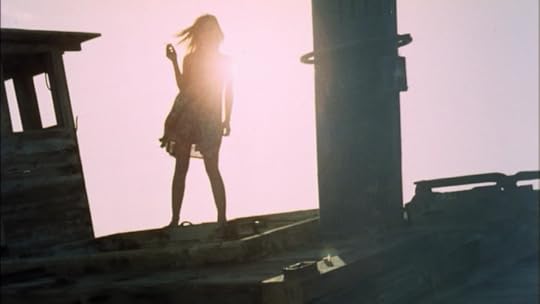
The Kid and his stolen cash represent a catalyst, a desperate, one-shot chance at a future that won’t come along again. The problem? The Kid is waiting for his partner, Mr Sunshine, who he insists will be along at any moment, to claim his half of the money.
Much of the film’s plot addresses the subsequent deadlock between the characters: this is the Mexican standoff of The Good, the Bad and the Ugly, but drawn out with increasing tension as each man navigates loyalty, fear, greed, betrayal, hope and cruelty in this forgotten place at the end of the world.

There’s a true sense of auteur-ship and vision here, in the characters, the repeated motifs, the daringly choreographed shots and, of course, the choice of soundtrack. Far from being a gimmick or an afterthought, CAN’s music is woven through the narrative; among the money in the Kid’s suitcase is a single 45″ record – CAN’s sinuous, sultry ‘Tango Whiskeyman’. The song itself is obviously important to the Kid, and unsettles Mr Sunshine, especially when the record becomes stuck as it plays hauntingly across the ruined town, leading to a moment of unbearable tension.
So why hadn’t I heard of Deadlock before now? There’s a rumour that although it was selected to be featured at Cannes, it was thrown off the programme when a group complained it wasn’t representative of Young German Cinema. Whatever the case, as a bleak and poetic acid western with stunning cinematography, characters as raw-edged and memorable as Leone’s and an absolutely killer soundtrack, Deadlock deserves to be better known.
If you enjoyed this review, you can sign up to my newsletter for exclusive access to new posts, short stories, works-in-progress and more.
April 29, 2021
Ten Low Pre-Order Gift
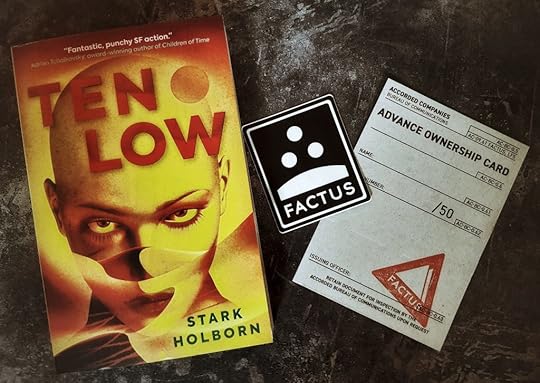 Postcard and sticker art and design by Tom Boot
Postcard and sticker art and design by Tom BootWith just over a month to go until TEN LOW is released, I’m offering a free gift as a big THANK YOU to people who pre-order. It includes:
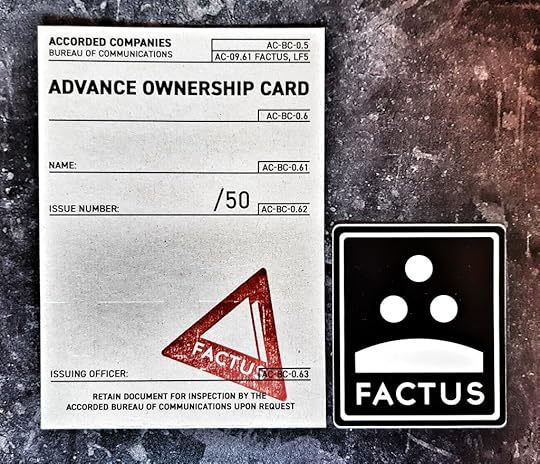
– One of 50 signed, stamped and numbered postcards
– A Ten Low themed vinyl sticker
Click here to request yours.
Here are some pre-order links: (p.s. pre-ordering from an indie bookshop earns extra author kudos.)
Mr B’s Emporium, Storysmith Books (Forbidden Planet, Portal Bookshop, Waterstones, Hive, Bookshop.org, Broken Binding, Amazon UK, Amazon US
Pre-orders are one surefire way to help boost a book’s success; they show Titan, my publisher, that readers are interested, and bookshops take notice too, especially when deciding which books to order in. And because they often count as day one sales, they help a book find visibility in the charts. So if you pre-order, thank you! I’m hugely grateful for the support.
P.s. if you have any problem with the request form above, just drop me an email via my contact form.
Still need convincing?
“With plenty of action and vivid worldbuilding, this tense adventure will have readers hooked.” – Publishers Weekly
“The future of space westerns, TEN LOW showed me the most vibrant desert world since DUNE. A stunning blend of pulp and literary exploration that leaves the old guard masters in the dust.” – Alex White, author of the Salvagers trilogy
April 6, 2021
Advanced Triggernometry: Meet the Mathmos
Curious about the cast of Advanced Triggernometry? Here’s a bit more information about the magnificent seven (real-world) mathematicians who inspired my crew of renegades.
Malago Browne (?)
Professor Browne is the only lead character not based on a historical mathematician. Since the books are written in first-person, I thought it best to make her wholly fictional. She’s at once a remarkable woman and a person just trying to get by, day to day. I wanted to give her a name that reflected this – like Halo Jones – half unique, half ordinary. The name ‘Malago’ is one anyone from Bristol will recognise; I liked it’s combination of suggestions, ‘mal’ – bad, ‘ago’ – former. She was originally Malago Brown, then by coincidence I discovered the work of pioneering mathematician Marjorie Lee Browne, and – wanting to pay tribute without co-opting her story – added the ‘e’ as a nod.
Outlaw name: “Mad” Malago Browne
Skills: Sharpshooter and Triggernometry Expert
Weapon of Choice: Rifle, Revolver and Protractor
Pierre de Fermat (1607-1665) Pierre de Fermat
Pierre de FermatPierre de Fermat was a mathematician best known for his contributions to analytic geometry, probability, and optics, as well as for his Last Theorem, which resisted proof for 358 years.
Fluent in six languages, Fermat studied and worked in law for most of his life, pursuing mathematics as more of a hobby. Despite this he made invaluable contributions to multiple fields. He wrote to – and disputed with – other contemporary mathematicians, like Pascal and Descartes, for much of his life.
Outlaw Name: Pierre “Polecat” de Fermat
Skills: Gambling, probability and optics
Weapon of choice: Pistols
Charles Lewis Reason (1818-1893)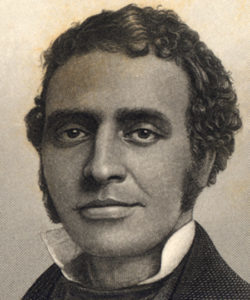 Charles Lewis Reason
Charles Lewis ReasonCharles Reason was born in New York to Haitian parents. At the New York African Free School, the young Reason showed an early gift for mathematics, and by the time he was fourteen, he had already become a teacher.
Also a talented poet, linguist, administrator and abolitionist, he went on to start a teacher training college, and in 1849 was appointed to the newly-opened Free Mission College (New York Central College) as professor in belles-lettres, Greek, Latin, French and mathematics, becoming the first African American professor to teach at a predominantly white college. He later became a political journalist and administrator of schools in New York, fighting to end the racial segregation of public schools in the city.
Outlaw Name: “The Professor”
Skills: Angular velocity, knife-throwing, languages.
Weapon of choice: Rulers (brass, steel and bronze)
Wang Zhenyi 王貞儀 (1768–1797)Wang Zhenyi was a scientist and mathematician who lived during the Qing dynasty. Defying the customs of the time, she educated herself in mathematics, astronomy, geography, medicine and poetry, becoming an acclaimed scholar.
During her youth she studied astronomy with her grandfather, poetry with her grandmother, maths, geography and medicine with her father, and horseriding, archery and martial arts with the wife of a Mongolian general. Her travels with her father, south of the Yangtze river, went on to inspire over a dozen volumes of poetry. She continued to study and teach mathematics, conducting research into celestial phenomena and writing texts that explained mathematical concepts in clear language for beginners. Although she died tragically young, aged twenty-nine, she left a lasting legacy through both her poetry and scholarly work.
Outlaw Name: Wang “Quickshot” Zhenyi
Skills: Celestial mechanics, projectiles, tactics.
Weapon of choice: Sextant and crossbow.
Évariste Galois (1811-1832) Évariste Galois
Évariste GaloisBorn outside of Paris, Galois started to take an interest in mathematics aged fourteen, though – like Sophie Germain before him – he was denied entry to the prestigious École polytechnique twice.
After the July Revolution and les Trois Glorieuses (during which he was locked into the École normale by the school’s director), Galois was expelled, joined the Republian artillery and later served six months in prison for threatening the life of the king. He continued to write and publish papers in which his unique leaps of logic baffled some mathematicians and delighted others.
Eventually, Galois was goaded into a duel – apparently over a love-affair – and was shot in the stomach. He died the next day, aged only twenty. His work, however, went on to have far-reaching consequences in many fields of mathematics.
Outlaw Name: “The Kid”
Skills: Radical circles, quick-draw.
Weapon of choice: Rifle, revolver, dagger and compass.
Archimedes (c. 287-212 BC)Archimedes of Syracuse hardly needs an introduction; a mathematician, engineer, inventor, physicist and astronomer, he is considered to be one of the greatest mathematicians of antiquity. Among his many contributions, he was one of the first mathematicians to apply principles of mathematics to physical phenomena, creating statics, hydrostatics, the principle that bears his name, as well as the Archimedes’ screw and the Archimedean spiral. He also invented defensible war machines, such as his rumoured Heat or Death Ray, designed to dazzle or set fire to ships in a harbour.
Archimedes was killed during Second Punic War after a two year siege on the city of Syracuse. The story goes that although invading General Marcus Claudius Marcellus gave orders for him not to be harmed, he was killed by a Roman soldier while trying to finish work on a drawing, his last words being “do not disturb my circles!”
Outlaw Name: “The Greek“
Skills: Inventing, engineering, reflections.
Weapon of Choice: Death Ray.
René Descartes (1596-1650) Rene Descartes
Rene DescartesDescartes, aka Renatus Cartesius, was a French-born mathematician, scientist and philosopher, famous for his statement: cogito, ergo sum – “I think, therefore I am.”
After studying to become a lawyer, Descartes abandoned law and joined the Dutch States Army as a mercenary, where he studied military engineering, and afterwards enrolled in Leiden University under the name “Poitevin” to pursue both mathematics and philosophy.
As a mathematician, he is best known for developing Cartesian or analytic geometry – using algebra to describe geometry. His work provided the basis for calculus later developed by Newton and Leibniz; he also studied optics and is credited with discovering laws of reflection and refraction. Descartes Meditations on First Philosophy (1641) continues to be a standard text in philosophy departments to this day.
Outlaw Name: “Poitevin” aka “René the Rat“
Skills: Optics, triggernometry.
Weapon of Choice: Mirrored Pistols.
You can pre-order Advanced Triggernometry for Kindle via Amazon and ebook via Gumroad.
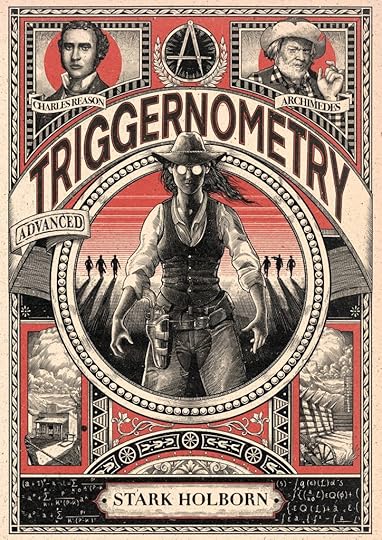
“Clever, funny, subversive, wholly original, and packs a bigger punch than a Colt Peacemaker.”– Joanne Harris, author of The Testament of Loki, The Strawberry Thief, Chocolat & many more
March 30, 2021
Exclusive Extract: Advanced Triggernometry

The Triggernometry series mixes the grit of the west with a cast of mathematicians from across history to create a truly unique and unforgettable adventure.
The second instalment – Advanced Triggernometry – finds Malago Browne riding out to defend a besieged town, along with six unlikely allies. Read on for an exclusive extract…
Chapter One: Alternative DenialA|B
‘Mrs Grey?’
Esther eyed me uncertainly over her spectacles. I saw myself reflected there, eyeglass to eyeglass, as if we were two creatures studying one another from opposite ends of a microscope.
‘Yes?’ I started to gather the slates, intending to wipe away the careful, clumsy arithmetic, only to find it had already been done. How long had I stood dreaming of the past?
‘There are some ladies here to see you,’ Esther said, with her infinite patience. ‘Shall I show them in?’
I looked up. In the doorway of the schoolhouse, three figures waited, silhouetted by the noon sun. Beyond them, children ran, hooting and hollering and kicking at a ball. My hand crept towards my hip and encountered only cloth. Schoolmistresses were not in the habit of carrying guns.
No matter.
‘Thank you, Esther. Close the door behind you.’
The young woman left with a final frown. She wished to say more, but we’d long ago reached a silent agreement. No questions about the other’s past. Until today, it had served us well.
The women came forwards, slowly, shoulders hunched as if they were demons walking into a consecrated place, afraid the hand of God might reach in and pluck them out. Their coats and skirts were thick with road-dust. The lead woman wore a rifle on her back.
Civilians. They stared at the children’s sums on the walls as if they were written in blood. Poor folk. Ordinary folk. So why was my neck crawling with ants?
Slowly, I opened the desk drawer. The instrument was there, ready. I rested my fingers upon it. ‘Can I help you?’
One of the womenjumped, her cheeks hot. Another stared, her grey eyes like scraped flint.
‘We’re looking forMalago Browne,’ the lead woman called.
‘No one by thatname here.’
The womanfrowned at me, then down at the books upon my desk. The title of the topmostvolume glinted in the sun.
NEW TRIGONOMETRY FOR SCHOOLS
WITH ANSWERS
‘It’s her,’ thewoman with grey eyes said, lip curling.
‘You aremistaken. I’m Mrs Grey, the schoolteacher.’
The woman with the rifle took a step closer. She was older than the others, wrinkles like intricate designs tooled into leather. A tarnished tin star hung from her vest. When her hand went for her pocket, I tensed, but she only brought out a piece of paper, grimy and much-handled.
The poster flopped over the stack of books. My own face, roughly sketched with malicious intent. And above it that old word, like a brand. WANTED.
I smiled. ‘A remarkable likeness, if an unfortunate one. Several other Capitol marshals have made the same mistake in the past. They all regretted pressing the issue.’
‘We ain’t here to take you in.’ She shifted uncomfortably. ‘We’re here on business.’
‘Don’t say you wish me to teach your children—’
‘You’d be dead before you tried,’ the grey-eyed woman spat, before clamping her lips closed.
‘We don’t want teaching,’ the third woman said. She was round-faced, ruddy-cheeked. ‘We want fighting. I mean, we want fighters. Like you.’
‘You want people desperate enough to do some dirty-work,’ I accused, knowing that five years ago I would’ve done it. Would’ve taken almost any job, so long as there was pay, or food, or a chance to use the skills that drove and haunted me. I shook my head. ‘I’m a teacher. That’s all.’
‘I told you she wouldn’t help,’ the grey-eyed woman said. ‘I told you it was useless.’
‘Then I wonder that you came at all, Lydia,’ the older woman snapped, before turning her gaze back to me. ‘It’s true, it ain’t an easy job. Ain’t a clean one either, depending on who you ask. We’re from a place called Summerville, day or so’s ride north of the border, but unless we do something soon, there ain’t going to be a town much longer.’ She worked her mouth. ‘We need help and we got nowhere else to turn.’
‘Turn to the Capitol.’
‘We can’t!’ the third woman burst. ‘It’s their man, Sheriff Austin; he poisons our young, he’s bleeding us dry. We need people who aren’t afraid of him. We can pay…’
I laughed. Bitterness was a deep well and it poured from my mouth. ‘The beast you made has snapped its leash and now you want the ones you called monsters?’ I flicked the poster onto the floor. ‘You’re on your own. As we were.’
The hard-eyed woman took the other’s arm. ‘Let’s go Minnie,’ she muttered. ‘This place is making me itch.’
They left the poster on the floor, where it had fallen. I looked down. In the open desk drawer, the old protractor glinted silver.
When she reached the doors, the marshal turned. ‘That gold you stole is burning a hole in your heart,’ she said.
Advanced Triggernometry is released in ebook on April 8th on Amazon and Gumroad. You can read the first instalment, Triggernometry, for free or pay-what-you-want via Gumroad or for £0.99p on Kindle for a limited time.
 Pre-order Kindle £2.49Pre-order ePub £2.49Add to Goodreads
Pre-order Kindle £2.49Pre-order ePub £2.49Add to GoodreadsRelease date: 8th April 2021
Want to stay up to date with news, get exclusive offers and free short stories? Sign up to my mailing list here.
March 15, 2021
Author-Published Books
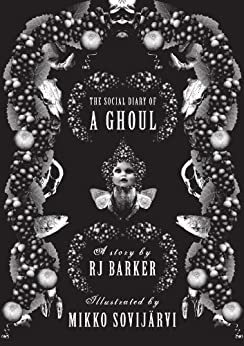
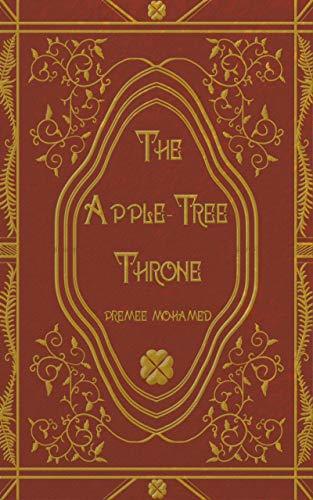
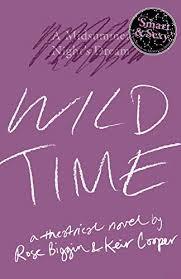

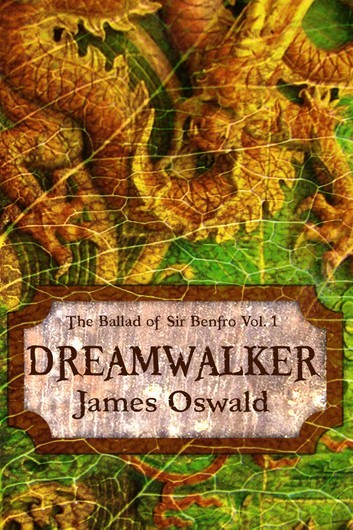

Here’s a list of work you can buy directly from authors. This is often one of the most direct ways to support an author whose work you enjoy, with the plus side that you might encounter writing that’s more unusual, niche or out of the mainstream.
A quick FYI: typical royalties from a self-published ebook are around 70%, while some platforms such as Gumroad offer as much as 90%. A standard publishing contract by contrast offers the author a 25% royalty for ebooks, dropping to 7-8% or a paperback sale.
I’ll try to keep this list updated as and when things come to my attention, but for now, check out the below. There are short stories, novellas, fantasy, songs, poetry, art books and more.
The Apple-Tree Throne by Premee Mohamed
It is the turn of the century in an England that never was. Bright new aqua-plants are generating electricity for the streetlights; news can be easily had on the radio-viz; and in Gundisalvus’ Land, the war is over and the soldiers are beginning to trickle home. Amongst these is Lt. Benjamin Braddock, survivor of the massacre that ended the war, and begrudgingly ready to return to a world that, well, doesn’t seem to need him any more than it did in peacetime. His friends have homes and families to return to, while he’s got nothing but his discharge papers and a couple of unwanted medals. Oh, and one new thing: the furious ghost of his commanding officer.
Dominion of the Fallen stories and other novellas, by Aliette de BodardIn a Paris that never was, a city of magical factions where Fallen angels mingle with magicians, alchemists and witches… Emmanuelle is the Fallen archivist of House Silverspires, and only wants a quiet life with her books. But when Selene, the latest student of Lucifer Morningstar, walks into the library, Emmanuelle finds herself drawn in an adventure to steal from another House. It’s a thrilling and dangerous task, but the most dangerous thing about it might just be Selene herself — aloof and resourceful, and unexpectedly attractive…
Set in the universe of the critically acclaimed The House of Shattered Wings.
Wild Time by Rose Biggin and Keir Cooper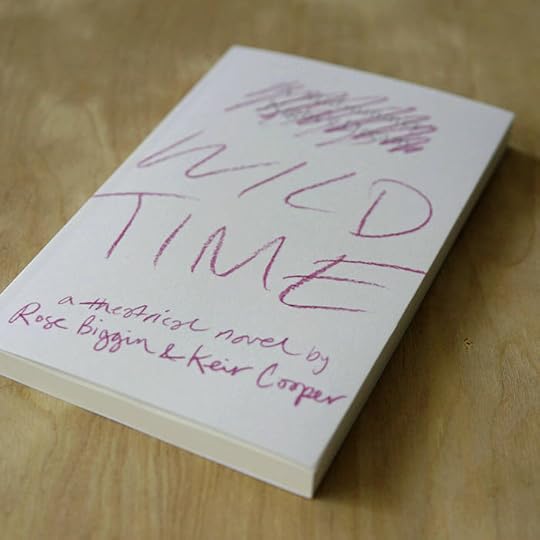
The Duke of Athens and the Amazon Queen are getting married in the morning. It’s going to be a big one, and everyone’s invited. The King and Queen of the Fairies arrive into ancient Athens, ready to be guests of honour at the party of the age. There’s a gifted new Changeling in town — a uniquely talented human who’s attracting some attention. Titania has plans, Oberon’s wound up about it, there’s a long night ahead and naturally it all comes down to who does what. The planets have their own ideas, and elsewhere, deep within the forest, we see a leatherworker and part-time male stripper rehearsing a play that’s ahead of its time…
Johannes Cabal Stories and Goon Squad by Jonathan L. HowardThe entirety of Jonathan L Howard’s prose-comic Goon Squad series is available online, plus a selection of stories featuring everyone’s favourite necromancer, such as Exeunt Demon King:
Johannes Cabal, a necromancer of some little infamy, has faced many horrors during his career, but in this tale he tells of an early encounter with something that horrified even him.
Pantomime.
A provincial theatre has seen a series of strange deaths. The young Cabal investigates, even though this requires him to don red tights, a curling moustache, and become… the Demon King.
Beyond the Line of Trees by Vida Cruz
What will you find beyond the tree line?
A warrior and a cook’s hidden relationship provokes the wrath of the jungle. An ill-tempered handmaiden goes to live with her dead brother-turned-mango tree. An apathetic mother goes to retrieve half her heart from a sinister first love. A strong-willed farm girl plays housekeeper to a kapre with a secret.
This first illustrated short story collection — with a foreword by Nikki Alfar — by British Science Fiction Association longlisted author Vida Cruz is full of fantastic tales and sweeping epics of love, loss, adventure, and history.
Romancing the Page by Laura AmbroseThe pseudonym of award-winning speculative fiction author Laura Lam, Romancing the Page is a series of f/f novellas set within the world of science fiction and fantasy publishing.
Natalie and El used to be writing critique partners, sharing their work chapter by chapter. Falling in love off-page was like the next part of the story.
Now three years have passed in bitter silence. So when Natalie attends a convention and El’s appearing under a pseudonym, she’s horrified. When ignoring each other proves to be impossible, she begins to contemplate the unthinkable. Should she let a hidden hope fly?
Interment and The Social Diary of a Ghoul by RJ Barker, illustrated by Mikko Sovijarvi
Not everything in the garden wants to be there.
Interment is a disturbing and idiosyncratic work of psychological horror. Part graphic novelette, part story, part poem and partly art.
This is the first of three illustrated prose poems written by RJ Barker and illustrated by Mikko Sovijärvi .

A Pocketful of Crows is a continuous suite of original music, songs and spoken word, based on Joanne Harris’ 2018 novella.
Plus check out the Ko.fi for regular storytime posts, short stories, exclusive excerpts and more.
The Ships of Aleph by Jaine FennLachin is a dreamer. He’s just too curious for his own good. When he gets the chance to be part of an expedition which will allow him to escape the confines of his village, of course he takes it; he wants to see the world. But the world is not what he thought it was…
The Ships of Aleph is a fantastical adventure set on a world like no other, which fits into Jaine Fenn’s popular Hidden Empire universe.
The Ballad of Sir Benfro by James Oswald
James Oswald’s Sir Benfro series is self-published in the US, as are several of his Inspector McLean crime thrillers.
In a small village, miles from the great cities of the Twin Kingdoms, a young boy called Errol tries to find his way in the world. He’s an outsider – he looks different from other children and has never known his father. No one, not even himself, has any knowledge of his true lineage.
Deep in the forest, Benfro, the young male dragon begins his training in the subtle arts. Like his mother, Morgwm the Green, he is destined to be a great Mage. No one could imagine that the future of all life in the Twin Kingdoms rests in the hands of these two unlikely heroes.
But it is a destiny that will change the lives of boy and dragon forever …

My own self-published Triggernometry series continues on April 8th with Advanced Triggernometry, which is available for pre-order from Amazon and Gumroad.
For more news, stories and announcements you can also sign up to my newsletter.
January 13, 2021
Stark Reviews: Prospect (2018)
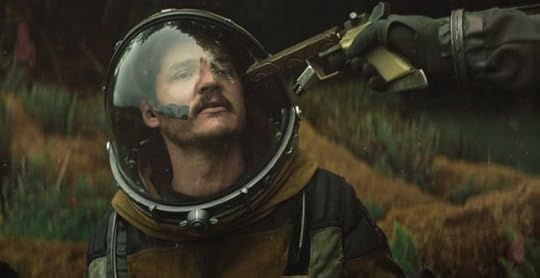
My favourite science fiction films have always been the onesthat feel lived in. Like Deckard’s apartment in Bladerunner or the scruffy, beige, utilitarian mess hall of theNostromo, or – pushing it to the extreme – the entirety of Aleksei German’s Hard to be a God. To me it’s a mark ofgood world-building, and something that the original Star Wars: A New Hope did so well: I want to believe that the storyI’m experiencing is just a slice of a much larger universe, happening beyondthe frame. That the world doesn’t solely exist to serve the narrative.
Prospect puts a big, bold tick in this box right from the start. The film opens with the view of a beautiful, green and blue shimmering planet… through a scratched and graffitied window that has seen better days. It’s the perfect introduction to the film’s leads, teenage Cee (Sophie Thatcher) and her beaten-down, substance-reliant father, Damon, played by Jay Duplass: two people clinging to solvency by their fingernails, scraping a living at the edge of the system.
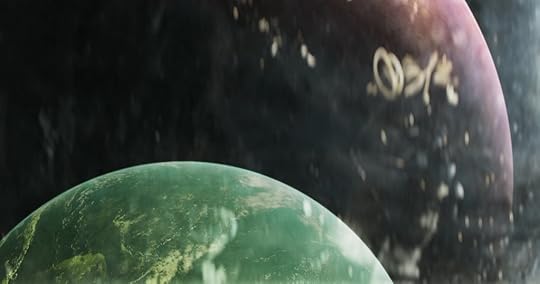
With brilliant economy of storytelling, during the first scenes in Cee and Damon’s claustrophobic rented ship/living pod, directors Zeek Earl and Chris Caldwell introduce us to the characters and set fire to the touch-paper of tensions that will play out over the course of the film. Everything in the pod looks cramped, scuffed, scratched and patched-up. It’s a way of life that Damon seems only to cope with through use of various uppers and downers, and that Cee has been forced to adapt to; we see her mending her broken headphones, hinting at her resourcefulness, her ability to fix what she can within a broken environment. We get the distinct impression that no one cares what happens to them. There’ll be no rescue should they get into trouble or miss their connection with the final freighter heading out of the system.
It serves to heighten the tension as well as a sense of isolation on the edge of space. Like gold-rush miners making for lawless camps and foothills, Cee and her father are headed down to “the green”; a verdant planet where valuable crystal ore can be found within the pupae-like sacs of alien foliage. Toxic dust fills the air, meaning helmets – and radio communication – are essential.
What follows is a tense, character-driven space western, where individuals, desperation, greed and loyalties meet and clash; imagine The Treasure of the Sierra Madre mixed with Patrick deWitt’s novel The Sisters Brothers, shaken together with Alien. It’s a heady cocktail, and one that revels in its occasional strangeness while never veering too far into pastiche.

The Mandalorian’s Pedro Pascal is perfectly cast as shady ore-miner Ezra, who speaks at first in a sinister, E.B Farnum-esque drawl, but gradually loses his wise-cracks as the reality, and humanity, of his situation becomes apparent. Sophie Thatcher meanwhile, carries this film as Cee. Her character could so easily have been badly written, reduced either to a helpless flower or a one-dimensional “badass”. But Cee is believable; someone who’s grown up in less-than-perfect situations, and as a result is world-weary and serious, but with a deep well of perseverance. Despite everything, she’s still naive, and still occasionally finds the joy of youth.
There’s a particularly touching scene where – after facing various horrors – she relays her love for a series of children’s novels. The actual books have been long lost during their wanderings, so she re-writes them from memory over and again, to escape her own world and stay in that of the characters. It’s a thoughtful scene and a brave addition to a film that could easily have descended into relentless action.
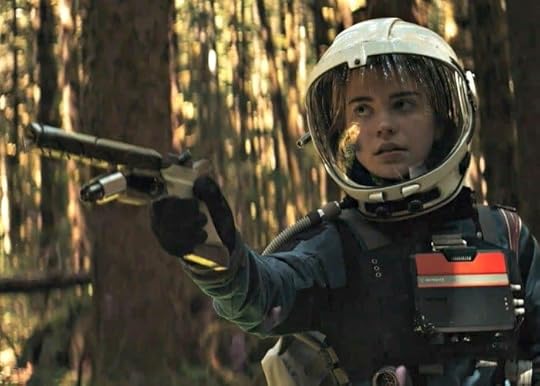
The cast of Prospect is small, but universally excellent, with some particularly memorable cameos from Andre Royo (you might remember him as Bubbles from The Wire) as steely, religious zealot Oruf, and Anwan Glover – of BYB and also Slim Charles in The Wire – as tough-as-nails mercenary Mikken.
Prospect was shot on a super low-budget for a sci-fi film – under four million – but as is sometimes the case when there are budget limitations, the filmmakers’ resourcefulness and economy of storytelling are what make it so great. Compare this film to one that’s considered low-budget by Hollwood standards, say 2012’s Dredd (fifty million). Not only does Prospect look as good (if not better), but unlike Dredd, Earl and Caldwell consistently use all of the ingredients available to them to full effect.
For one thing, they focus on the tangibility of the world. There’s not much CGI; almost all of the costumes, props and special effects were built and created by a dedicated team of artists, designers, cosplayers and engineers in a seven-month pre-production stint. In this way, Earl and Caldwell join the ranks of genre directors – from Peter Jackson with Bad Taste and John Carpenter with Dark Star – who began their careers creating their own special effects with memorable results.
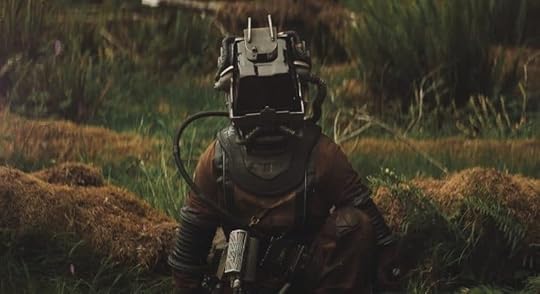
And while the props and costumes may have been created DIY-style, they certainly don’t look it. Here’s where that deft world-building comes into play again; the characters’ space suits are of different styles – hinting at different points and eras of origin. Equipment is constantly running out or half-broken, guns require a hand-wound charge that means any physical conflicts must be carefully thought through. Even the heavy, clunky helmets serve the narrative. At various points, characters have to rely on switching or masking radio frequencies, blasting out music to hide their conversations from others.
Sound is used to great effect here, much of it recorded inside the helmets of the actors, so we hear their breathing, increasingly muffled and laboured as their filters begin to fail. The soundtrack too, is an juxtaposition of evocative ambient by Daniel L.K Caldwell, and incongruous yet somehow perfectly matched flares of 1960s go-go, like Rita Chao’s 1968 ‘Crying in the Storm.’
Overall, Prospect had me hooked from the get-go, and didn’t disappoint. I’ll comfortably say it’s one of the best sci-fi films of the last ten years, and the fact that it’s a space-western just makes me appreciate it all the more. A must-watch.
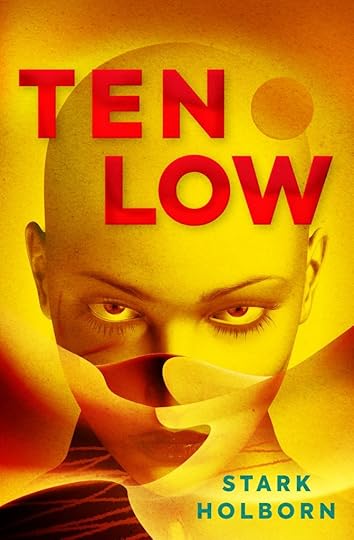
What’s that? You too like space westerns? Then you should check out my upcoming novel, Ten Low, set on a desert moon…
You can also sign up to my newsletter for sneak peeks, offers and free short stories.
December 3, 2020
Awards Eligibility 2020
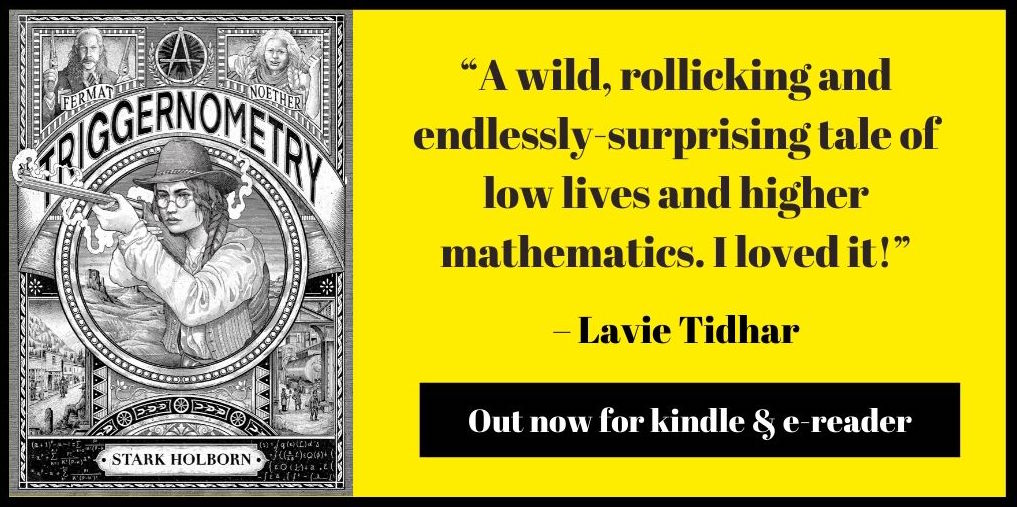
Short post this to say that Triggernometry – my weird-west novella about gunslinging mathematicians – is probably eligible for some awards, somewhere. It’s so far been featured on Tor.com and The Washington Post’s “best SFF of 2020”. You can currently get it from Amazon or download the epub for free (or pay what you want) on Gumroad, if you’d like to check it out.
It’s a novella, 20k words, and was published in ebook form in April of this year of pestilence (2020). Rattleback Books, if you need a publisher name.
Other than that, I’ve been doing a lot of games writing, but those aren’t being published until next year and the year after. Some of my short interactive fiction might also be eligible for nomination for games writing, check out:
The Gallowtown Incident (Ink – July 2020)
A Case of Trouble (Ink – Aug 2020)
In terms of non-fiction, apart from my reviews and round-up posts, I wrote about Women and the Western: In Front of and Behind the Camera for Screen Queens (May 2020).
Oh, and if you’re into westerns or science fiction or games, and would like the occasional free short story, news or offer, then you can sign up to my newsletter, below:
Join my e-mail list
By clicking submit, you agree to share your e-mail address with the site owner and MailChimp to receive marketing, updates, and other e-mails from the site owner. Use the unsubscribe link in those e-mails to opt out at any time.
Processing…
Success! You're on the list.
Whoops! There was an error and we couldn't process your subscription. Please reload the page and try again.
December 2, 2020
Stark Reviews: Bacurau (2019)
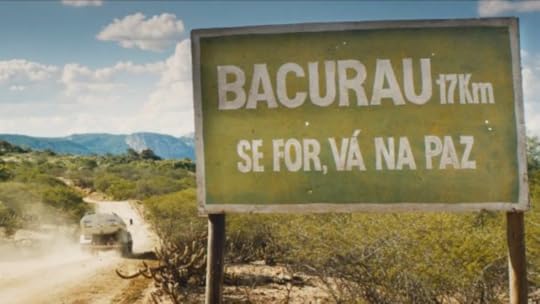 “If you go, go in peace.”
“If you go, go in peace.”One of the problems of being a writer is that – when you spend all day making things up – you can sometimes see story beats from a mile away, stretched out like a long silhouette across the desert sand.
Which is why it’s so refreshing when a film comes along that so thoroughly drives its narrative out of a genre’s ruts, while still giving the occasional backwards nod to what has gone before.
From director Kleber Mendonça Filho (Aquarias) and production designer turned co-director Juliano Dornelles, Bacurau is billed as a weird west spaghetti western that focuses on a fictional town in the sertão – the remote hinterland of north-eastern Brazil – called Bacurau (“nighthawk)”, which finds its existence threatened by outside forces.
If that sounds vague, it’s because I don’t want to give too much away. Part of the joy of this film was not knowing what was coming. But from that pitch, you might expect to meet the usual western revenge or last-stand themes, maybe the Technicolor violence and bloodshed of Corbucci, or the larger than life characters and bleak humour of Leone. And the thing is, you’d be right. All of these elements are present in Bacurau, but they’re handled with such freshness, verve, narrative ferocity and overall confidence, that they produce something remarkable from well-trodden ground: a truly original western.
Whenever people talk about the re-invention of the western, this is the sort of film I’ve been hoping for, from two filmmakers who aren’t afraid to pull the genre apart, take what they want and shake it together with their own ideas.
“We subscribe to the genre, but we don’t fully respect it.”
Kleber Mendonça Filho
One of Bacurau’s greatest strengths is how assured it is. The film opens with cool-headed Teresa (Bárbara Colen), a medic from the city who is returning to her small, remote hometown for the funeral of her grandmother Carmelita: the matriarch of Bacurau.

From the get-go, Teresa’s journey is packed with ominous foreshadowing. She travels in a water truck: Bacurau’s supply has been cut off by a corrupt damming operation, which in turn is being challenged by a mysterious bandit and hero-of-the-people, Lunga. On the drive, Teresa passes a traffic accident, where a lone motorcyclist lays dead while a truck has spilled its cargo of coffins onto the road.
Teresa brings with her a vital store of medicines for the isolated community, which is underserved and misused by slimy local politician Tony Junior (Thardelly Lima). On her arrival in Bacurau, one of the old-timers immediately places a homemade hallucinogenic pill onto her tongue: an act that draws her straight back into the communal rituals of the self-sufficient, tightly-knit town.
Soon, it becomes clear that something strange is happening. The water truck arrives filled with bullet holes, and Teresa’s father, a teacher, realises that the town has been erased from online maps, and instead must show the children its location on a paper map in the schoolroom. Then, phone signal disappears, the classic herald of bad times to come. And here’s where the directors show their confidence, because although Teresa is our way in to Bacurau, we don’t stay with her. The narrative point of view widens, taking in the experiences of multiple inhabitants, then their enemies and outsiders in a way that serves the story without ever losing focus.

We’re not given much detail about the wider world itself, which is good because we simply don’t need it. The opening screen tells us the narrative is set “a few years from now”, in a world where revenge murders, such as those committed by Teresa’s lover Pacote/Acacio (Thomas Aquino) are commonplace, and political corruption is rife. Rather than spend time on unnecessary world-building, the filmmakers focus on what is important: the community of Bacurau itself and the threat it faces.
“Have you seen the town museum?” characters repeatedly ask the foreigners, foreshadowing both their pride in the region, and the ultimate importance this building plays, both in the narrative and in the life of the town as a site of remembrance and resistance.
Based on quilombos – settlements formed by Africans who escaped enslavement in the 1600s, Dornelles has commented that the town of Bacurau is:
“a micro-representation of Brazil. We have many different ethnicities. It was very important to us, because it’s a film about the community. There are no leading roles, there are many important characters. So if they are very different from each other, it’s more interesting.”
The characters we encounter are indeed vivid and memorable; from actor and celebrated drag performer Silvero Pereira, who steals the show as the queer bandit-leader Lunga, to Brazilian super-star Sônia Braga as Domingas, the town’s alcoholic, courageous doctor. Alongside professional actors, the directors peopled the town with locals from the area where the film was shot, especially recruiting those who were seen as “outcasts” or misunderstood in their own communities.
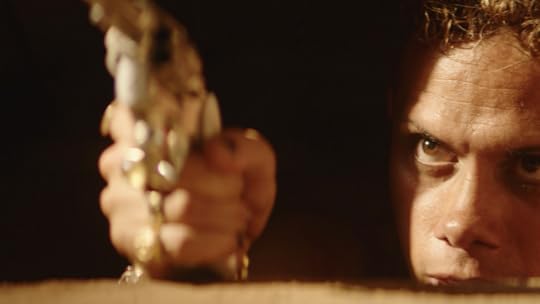
Contrary to the somewhat homogeneous villagers of, say, The Magnificent Seven, Dornelles and Mendonça Filho show us the opposite: that Bacurau is a community of individuals. They bicker, quarrel, get drunk, laugh, grieve, and ultimately fight together. The town feels vivid, gritty and realistic, in stark contrast to the dislocated sterility and psychopathic posturing of the antagonists – made up of a proto-Nazi (Udo Kier) and a collection wealthy white people from the northern hemisphere – who threaten Bacurau’s existence.
It was during the scenes when the action switches to the antagonists – and the dialogue into English – that I felt that the film was teetering on the edge of being heavy-handed, before I realised that these were essential parts of the whole. The brash shift in tone reflects the film’s wider themes; compared to the people of Bacurau, the antagonists are shallow and empty, spouting their own exposition and leaning into tropes. It’s all part of the film’s repeated upending of the conventions of the western, and of Hollywood.
Bacurau has been called “blunt political satire”, and yes, the film takes on themes of class, political corruption, greed and the violent legacy of colonialism with rage and ferocity. It is blunt at times, but it’s also lyrical, surprising, tender, darkly funny, bloody and brutal. It’s a film in dialogue with Brazil’s current political reality that remains cinematic. It absolutely refuses to be one thing, and is so much better for it.
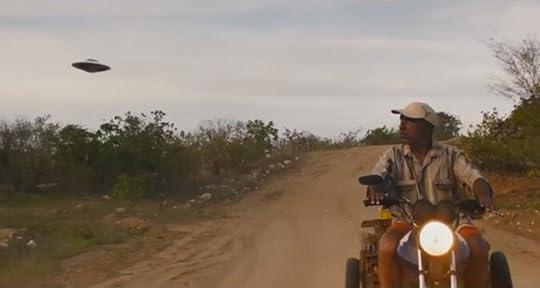
Mendonça Filho has spoken before about how John Carpenter’s lower budget films, like Assault on Precinct 13, made film-making seem possible to him as a young teenager. Look closely and you’ll see nods all over the place; the school in Bacurau is named “João Carpinteira”, and the claustrophobic final fight sequences pay definite homage to Precinct 13. There are also Star Wars-esque screen-swipes and Seven Samurai-style choreography. The cinematography by Pedro Sotero ranges from taut and focused action, to long, lingering shots of the dusty sertão, or the vast, fortress-like walls of Lunga’s base in the disputed dam.
The directors and Sotero chose to shoot the film in super wide screen, using Panavision anamorphic lenses to invoke 1970s American cinema and capture the broad vistas typical of the western genre, but also because they imagined the film as a full-scale, cinematic audience experience. Unfortunately, this ambition was hampered somewhat, thanks to Covid-19. I watched Bacurau projected onto my bedroom wall, but I sincerely hope that one day, I’ll be able to see the film on the big screen in all its glory.
Because Bacurau deserves it. Not only is it one of my favourite films of the year, it’s the best western I’ve seen in a long time.
If you’re interested in westerns – weird or otherwise – and would like access to free short stories, offers and more, then sign up to my occasional newsletter, below:
Join my e-mail list
By clicking submit, you agree to share your e-mail address with the site owner and MailChimp to receive marketing, updates, and other e-mails from the site owner. Use the unsubscribe link in those e-mails to opt out at any time.
Processing…
Success! You're on the list.
Whoops! There was an error and we couldn't process your subscription. Please reload the page and try again.
Assault on Precinct 13 vs Rio Bravo
Like weird westerns? Check out Triggernometry.
October 2, 2020
High-8 Video Rentals #2

For the curious, here’s the full list of films that can be found within the ever-shifting walls of High-8 Video Rentals.
High 8 Video Rentals is a regularly occurring interactive fiction series written using Ink, set in a video shop that gives out recommendations for interesting films currently available on streaming platforms… You can play it for free on Itch.io
Westerns:
Buck and the Preacher (1972) Prime, £
Lemonade Joe (1964) Prime
Comedy:
Big Night (1998) Netflix
The Interminable Suicide of Gregory Church (2011) Vimeo £
Horror:
The Devil’s Backbone (2001) Prime, £
Night of the Living Dead (1968) BBC iPlayer
Documentary:
Finding Vivian Maier (2013) Prime
Three Identical Strangers (2018) Netflix, All4
Crime:
The Hitchhiker (1953) YouTube , Public Domain, Prime
Drunken Angel (醉いどれ天使) (1948) BFI Player / Prime £
Writer in Residence: Jonathan L. Howard
Jonathan L. Howard is a British writer and game designer, known for his work on the Broken Sword titles, his Johannes Cabal the Necromancer series, and for Carter & Lovecraft. His recommendations are:
Alice (1988) Prime
Banshee Chapter (2014) Prime
Clerk’s Recommendation:
Victoria (2015) Prime £
August 28, 2020
High-8 Video Rentals: #1

For the curious, here’s the full list of films that can be found within the ever-shifting walls of High-8 Video Rentals.
High 8 Video Rentals is a regularly occurring interactive fiction series written using Ink, set in a video shop that gives out recommendations for interesting films currently on streaming platforms… You can play it for free on Itch.io
Westerns:
Meek’s Cutoff (2011) Prime
The Shooting (1966) Prime
Comedy:
Fighting with my Family (2019) Netflix
Top Secret! (1984) Prime £
Horror:
The Platform (El Hoyo – 2019) Netflix
Christine (1983) Netflix
Documentary:
Wormwood (2017) Netflix
Minding the Gap (2018) BBC iPlayer
Crime:
You Were Never Really Here (2017) Netflix
Klute (1971) Prime £
Wildcards:
What Did Jack Do? (2017) Netflix
Bad Taste (1987) Prime
Clerk’s Recommendation:
High and Low (1963) Prime £



